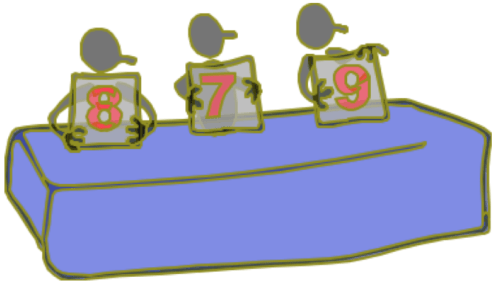The Purpose of Olympic Scoring is to extract some consensually validated new product, process, or other innovative ideas or concepts while encouraging 100 percent participation. The following is particularly appropriate when facilitating Olympic scoring with larger groups of nine or more participants.
In advance, inform all of your participants to bring at least one idea or response to a prepared question. Immediately capture them during the meeting or workshop. While focused on a central theme (e.g., solution to a problem), break down your primary question into small, manageable pieces.
For example, do NOT ask what does the Marketing Plan look like. Understand that “Y” is a function of numerous large “X” and small “x” so ask solid, detailed questions such as: Who should be our target audience for _________? What should the message for target audience _____________?
Methodology of Olympic Scoring
Build three sets of flashcards with the numbers one through ten on each set. Consider using 4in * 6in index cards. In the meeting or workshop, consciously or randomly select three class members (“experts”) who will serve as judges rather than content providers.
After meeting participants present each idea or concept, the judges flash their scores, with more being better (i.e., ten is the best). The facilitator captures the three scores and tabulates them on a large Post-It®. The highest score does not necessarily win, but the discussion will be minimized, if not eliminated, around the low-scoring options, thus encouraging the group to focus its discussion on the best candidates.
Deliverable from Olympic Scoring
Subsequently or concurrently the facilitator leads discussions about the reason(s) to support the higher scores and captures the reasons and rationale for their decision on large Post-Its. The reasons provide the criteria that can now be used to re-evaluate all the ideas or to create new ideas, that optimally satisfy the appropriate criteria.
Considerations when Olympic Scoring
Consider prioritizing or weighting the criteria since some will be more important than others. Traditionally the weighting system runs from one to five where more is better. You might use the Scorecard tool to calculate detailed scores or consider using the Perceptual Map tool and arraying your options against the most important criteria.
If you have your participants prepare responses to more than one question, and have additional time, start over again. Consider appointing new judges so that all voices are viewed as equal contributors.
______
Don’t ruin your career by hosting bad meetings. Sign up for a workshop or send this to someone who should. MGRUSH workshops focus on meeting design and practice. Each person practices tools, methods, and activities every day during the week. Therefore, while some call this immersion, we call it the road to building high-value facilitation skills.
Our workshops also provide a superb way to earn up to 40 SEUs from the Scrum Alliance, 40 CDUs from IIBA, 40 Continuous Learning Points (CLPs) based on Federal Acquisition Certification Continuous Professional Learning Requirements using Training and Education activities, 40 Professional Development Units (PDUs) from SAVE International, as well as 4.0 CEUs for other professions. (See workshop and Reference Manual descriptions for details.)
Want a free 10-minute break timer? Sign up for our once-monthly newsletter HERE and receive a timer along with four other of our favorite facilitation tools, free.

Terrence Metz, president of MG RUSH Facilitation Training, was just 22-years-old and working as a Sales Engineer at Honeywell when he recognized a widespread problem—most meetings were ineffective and poorly led, wasting both time and company resources. However, he also observed meetings that worked. What set them apart? A well-prepared leader who structured the session to ensure participants contributed meaningfully and achieved clear outcomes.
Throughout his career, Metz, who earned an MBA from Kellogg (Northwestern University) experienced and also trained in various facilitation techniques. In 2004, he purchased MG RUSH where he shifted his focus toward improving established meeting designs and building a curriculum that would teach others how to lead, facilitate, and structure meetings that drive results. His expertise in training world-class facilitators led to the 2020 publication of Meetings That Get Results: A Guide to Building Better Meetings, a comprehensive resource on effectively building consensus.
Grounded in the principle that “nobody is smarter than everybody,” the book details the why, what, and how of building consensus when making decisions, planning, and solving problems. Along with a Participant’s Guide and supplemental workshops, it supports learning from foundational awareness to professional certification.
Metz’s first book, Change or Die: A Business Process Improvement Manual, tackled the challenges of process optimization. His upcoming book, Catalyst: Facilitating Innovation, focuses on meetings and workshops that don’t simply end when time runs out but conclude with actionable next steps and clear assignments—ensuring progress beyond discussions and ideas.




